- Home
- Lois Lowry
Anastasia at Your Service
Anastasia at Your Service Read online
Anastasia At Your Service
Lois Lowry
* * *
Decorations by Diane de Groat
Houghton Mifflin Company Boston
* * *
Library of Congress Cataloging in Publication Data
Lowry, Lois.
Anastasia at your service.
Summary: Twelve-year-old Anastasia has a series of
disastrous experiences when, expecting to get a job as
a lady's companion, she is hired instead to be a maid.
Sequel to "Anastasia again."
[l. Servants—Fiction. 2. Friendship—Fiction]
I. De Groat, Diane, ill. II. Title.
PZ7.Lg673Amd 1982 [Fic] 82-9231
ISBN 0-395-32865-9 AACR2
Copyright © 1982 by Lois Lowry
All rights reserved. For information about permission
to reproduce selections from this book, write to
Permissions, Houghton Mifflin Company, 215 Park Avenue
South, New York, New York 10003.
Printed in the United States of America
EB 20
* * *
For Ben and Grey
1
"Groan," said Anastasia Krupnik feebly, and kicked the living room couch with one sneaker. She was lying on the living room floor. She was terribly depressed. She was so depressed that she had been acting out all the deathbed scenes she could think of. Beth, in Little Women. (A few small coughs, and then, weakly, "Farewell, my dear sisters.")
Juliet. (A gulp of poison, a horrible face because poison probably tasted terrible, and then, sadly, "Sorry things didn't work out, Romeo.")
Charlotte, in Charlotte's Web. (No final words, because spiders couldn't talk. But a few writhes. Probably spiders would writhe, dying. Then all eight legs—or six? Anastasia couldn't remember—straight up in the air. Tough to act that one out, when you had only two legs.)
She wondered what would happen if her parents found her dead on the living room floor. Probably her mother would say, "For Pete's sake, I just cleaned this room yesterday, and now look at it."
She groaned again. "Groan." Feebly, still, but a little louder.
There was no response from anywhere. Deathbed scenes weren't any fun at all without an audience.
"GROAN," she roared, finally.
Her mother appeared in the doorway with an orange potholder mitten on one hand.
"Did you call me?" she asked cheerfully. "I thought I heard someone call 'Mom.'"
"I was groaning, for Pete's sake," said Anastasia. "Can't you even recognize a groan when you hear one?"
"Do it again."
"GROAN," roared Anastasia. Then she went on, dramatically, "I am dying. I have clasped an asp to my bosom."
"Must have been a heck of a disappointment for the asp. You hardly even have a bosom."
"Mom!" Anastasia sat up and threw a cushion at her mother.
"Sorry. That was a rotten thing to say. You've got the groaning wrong, though, incidentally. You don't say 'groan' when you're groaning. A good groan sounds like this: 'Arrgghh.'"
"Hey, that's pretty good."
"You try it."
"Arrggghhhh."
"Not bad. I would have come right away if I'd heard that. Do it again, louder."
"AAARRRRGGGGHHHHH."
"Terrific. Wait a minute while I get my cup of coffee and then I'll ask you what's wrong."
Anastasia followed her mother to the kitchen and poured herself a glass of Kool-Aid.
"Now then," said her mother as she stirred her coffee, "what seems to be the problem?"
"Severe depression." Anastasia sighed.
"Well, I can see that. What's causing the depression?"
Anastasia thought, while she sipped her Kool-Aid. "Boredom," she said. "And also poverty. Extreme poverty."
"I can relate to that," said her mother. "At least to the poverty part. Your dad and I have never been rich. We never will be rich. English professors don't make very much money, and he's always going to be an English professor, because he loves it. And I'm always going to be an artist, because that's what I love, and artists never make much money."
"Mom," said Anastasia patiently, "I'm not talking about that kind of poverty. I'm talking about twelve-year-old, extreme, desperate, two-dollar-a-week-allowance kind of poverty. If I really did want to kill myself with an asp, I wouldn't be able to, because I wouldn't be able to afford an asp."
"True," said her mother. "Asps don't come cheap in Massachusetts."
"And as for the boredom..."
"Yes. Tell me about the boredom. I can't remember ever being bored. Also, Anastasia, I can't remember you ever complaining of boredom before. Just last week you were in and out of the house all the time, with a million things to do. You were playing tennis every day, and you were off riding your bike, and when I wanted you to help with the dishes I could never find you. Now I can always find you, because you're always lying on the floor saying, 'Farewell, cruel world.' What's happened?"
"Steve Harvey." Anastasia sighed. "The only person I know in this town. At least the only person my age. My tennis partner. My bike-riding companion. My only friend, for Pete's sake."
"I'm your friend," said a very small voice. Anastasia's brother, Sam, padded into the kitchen, with his shoes untied, and climbed into a chair. "I want some Kool-Aid. I want my friend Anastasia to pour me some Kool-Aid, please," he said.
"Oh, for Pete's sake," said Anastasia. She poured some Kool-Aid into Sam's plastic clown cup. "Here. Don't spill it."
"You're right, Sam," said her mother, smoothing his curly hair. "You are Anastasia's very dear friend. But right now she's not talking about two-year-old friends. What's happened to you and Steve, Anastasia? Did you have a fight?"
"No, of course not. But he's the only person my age that I've met since we've moved here. And he was going to introduce me to other kids before school started. He was going to have a big cookout at his house. He was going to have it next week, in fact..."
"And now he isn't?"
"Now, for Pete's sake, he's gone all of a sudden. Somebody called his father, some big-deal sports figure, and asked if Steve would like to go to a basketball camp in New Hampshire. They gave him a full scholarship, for Pete's sake. Nobody's ever offered me a full scholarship anywhere, except that time Dad offered to buy me a one-way ticket to reform school."
"He was only kidding, Anastasia."
"No, he wasn't. He was really mad."
"Well, yes, that's true, he was really mad..."
"Because I left his dumb Billie Holiday records on the radiator and melted them."
"But he didn't mean it about reform school."
"I know." Anastasia sighed. "Watch it, Sam. You're going to spill that if you're not real careful." Sam had picked up the pitcher of Kool-Aid and was pouring himself another cup.
"No I won't," said Sam sweetly. Then the pitcher slipped out of his hand. Grape Kool-Aid poured over the kitchen table and into Anastasia's lap. Her best jeans. Her favorite shirt. Purple. And sticky. And cold.
"AARRRGGGGHHHH," said Anastasia.
Sam climbed out of his chair quickly. "I'm going out to play," he said. "I'm going to play in the yard." He scooted through the back door.
Her mother grabbed two towels and a sponge and began to mop the table.
"AARRRGGGGHHHH," said Anastasia again, holding her purple, cold, sticky shirt away from her body.
"Sam," called her mother through the kitchen window to the back yard, "while you're out there, look around in the bushes, would you? See if you can find an asp for your sister!"
"Ha, ha," said Anastasia, dripping sarcasm along with Kool-Aid.
***
Anastasia lov
ed suppertime. Especially when they had lasagna, as they did tonight. Her mother was the best lasagna-maker in the whole world. If ever there were a National Lasagna Bake-Off Contest, her mother would win, she was quite certain.
She had told her mother that once. But her mother had made a terrible face, with her eyes crossed and her tongue sticking out. Apparently her mother didn't want to win a National Lasagna Bake-Off Contest. Anastasia could understand that. Probably the prize would be an apron or something.
Even when they didn't have lasagna, Anastasia loved suppertime, because the whole family, all four of them, were there, and they talked a lot. Often they talked about their problems, and it was absolutely amazing, Anastasia thought, how problems seemed less monumental if you talked about them while you ate lasagna. Or even pot roast, or tuna-fish casserole.
When she was older, and her spelling had improved a bit, Anastasia planned to write an article for the Journal of the American Psychiatric Association. In it, she was going to tell all the psychiatrists in America that if they served dinner to their patients, preferably lasagna (though pot roast or tuna-fish casserole would be okay), their patients would be cured of all their problems much faster.
("Oh, Doctor," Anastasia imagined a psychiatric patient saying, "I see purple leopards lurking behind the furniture. I will commit suicide if they don't go away."
"Hmmmm," the doctor would say. "Would you like some grated cheese on your lasagna? Tell me more about the purple leopards."
"Leopards? Were we talking about leopards? Funny, I don't remember anything about purple leopards. I would like more salad, though. And would you pass the rolls, please?")
"Dad," asked Anastasia as they ate, "do you have your notebook with you?"
He looked surprised. "Of course I have my notebook. I always have my notebook with me. Every writer does. You never know, if you're a writer, when you might have to take notes on the human scene." He took his small leather-bound notebook out of his pocket.
"No kidding. What does that mean: notes on the human scene?" asked Anastasia.
He thought for a minute. "Well, I eavesdrop and observe people. Then I make notes about what I see and what I overhear. After a while, I use some of that stuff in poems."
That was fascinating to Anastasia. She had tried and tried to be a writer, but somehow she had never succeeded very well. Yet her father, when he was not busy being an English professor, was a pretty successful writer of poetry. She had never figured out just how he did it. And now it turned out to be so simple. Notes on the human scene.
"Read me some," she suggested.
He put down his fork and flipped through the pages of his little notebook. "Well," he said, "here's what I wrote just this morning. 'Sam looks like his mother when he sleeps.'"
Anastasia's mother smiled. Sam smiled.
"'They both sleep with their mouths open, and their bottoms sticking up in the air,'" he went on.
Anastasia's mother stopped smiling. "Myron!" she said. "If you ever use that in a poem, I will sue for divorce!"
Dr. Krupnik grinned. "Just observations," he explained. "Notes on the human scene. Why did you ask if I had my notebook, Anastasia?"
"Because I have a problem. You always seem to need your notebook when you help me solve my problems."
"True," said her father. "I'm a list-maker. Most problems can be solved by making lists." He uncapped his fountain pen.
"I have a problem too!" said Sam suddenly, in a stricken voice. "Make me a list, quick!"
Anastasia groaned. Sam was always interrupting her serious discussions.
"What's your problem, Sam?" she asked in a bored voice. If they didn't deal with his first, he would keep interrupting.
"A pea in my nose," he said, sounding frightened.
"You put a pea in your nose? Sam! Why on earth did you do that?"
"Sometimes it's not important to ask why, Anastasia," said her mother. She picked Sam up and carried him away to the bathroom. After a moment they were back.
"Operation Pea Removal successful," announced Mrs. Krupnik. "Sam, do not ever do that again. It is very dangerous to put anything into your nose."
"Also your ears," said Anastasia. "Don't ever put anything into your ears."
Sam sat there looking guilty. He didn't say anything. It was unusual for Sam not to say anything.
"Sam?" said Anastasia's father.
Sam didn't answer. He was looking down into his lap. A very guilty look.
"Sam? Do you have peas in your ears?"
Sam shook his head.
"What's wrong, then?"
"My bellybutton," Sam whispered.
His father leaned over and lifted Sam's little shirt. There was a pea, slightly squashed, stuck on Sam's bellybutton.
Sometimes it was very, very difficult to have a serious meal with Sam around.
"Now," said her father finally, with his pen poised over his notebook, "back to your problem, Anastasia. Sam, you eat your dinner. No more fooling around."
Anastasia listed her problems once again, for her father, the way she had for her mother that afternoon. Boredom. Poverty. Depression.
Dr. Krupnik wrote Boredom, Poverty, Depression in his notebook. He drew a box around them. He drew arrows pointing to the box. He drew a small flower. He drew three squiggly lines in a row. Finally he wrote one word with a flourish, underlined it, and put an exclamation point at the end of the word.
"There you are," he said. "Easy solution."
Anastasia pushed her glass of milk to one side so that she could see what he had written.
"Job!" it said at the bottom of the page.
Anastasia groaned.
"That sounds easy to you, Dad," she pointed out patiently, "because you're forty-seven years old and you have a job. You have a job teaching English at Harvard. And Mom, you have a job doing illustrations for that textbook on photography..."
"It is not easy," said her mother. "I spent all morning trying to draw the inside of a diffusion enlarger. If you think that's easy, Anastasia..."
"I didn't mean that. Of course the work isn't easy. But it's easy for you to get a job because you went to art school and everything. You have qualifications. Twelve-year-old people don't have qualifications for anything. Nobody gives a job to a twelve-year-old person."
Her father turned to a fresh page in his notebook. "Now the list-making really starts," he said happily.
"What do you mean?"
"Start thinking of the kinds of things you'd like to do. Things you'd be good at. Things someone might need someone to do. Then you'll start your own business, providing those services."
"Not baby-sitting. I hate baby-sitting."
Sam gave her a dirty look.
"Well, maybe I wouldn't mind baby-sitting if it were with a really well-behaved baby. But don't put baby-sitting down. Not until the very end, in case I'm desperate."
"Okay. Baby-sitting goes last. What shall I put first?"
Anastasia thought for a minute. "Well," she said at last, "promise not to laugh?"
"Anastasia!" said her mother. "We never laugh at you."
That was true. It was one of the things she liked about her parents.
"Okay. Here goes. What I'd really like to do—and I'd be good at, too—is to be a companion to an old lady. A really rich old lady. Like in mystery books by Mary Roberts Rinehart. Those really rich old ladies hire young girls—maybe not twelve, but I could do it just as well as someone older—to hang around and help them out with stuff. Read their mail to them. Make tea for them. Maybe polish their diamond bracelets and stuff like that. Of course, in the books they have to help solve mysteries, and I don't suppose anyone in this town needs mysteries solved. But there are all sorts of things that I could do for a rich old lady."
"Does she have to be rich?" asked her mother. "There are certainly a lot of poor —or even just average—old ladies who could use someone to help them out."
"Yeah," Anastasia acknowledged. "I know. But Dad asked me what I
really wanted to do. And I think I'd really like to work for a rich old lady. We can put poor ones and average ones down as a separate category."
Her father nodded. He was busily taking notes.
"Goodness," said her mother. "What if some wealthy old woman really hired you, Anastasia? Wouldn't you be nervous? What would you say when you knocked on the front door? What if a butler answered?"
"Well, I guess I'd just say, 'Here I am: Anastasia Krupnik, at your service!'"
Sam giggled. His mouth was full of peas. "Anastasia atcherservice!" he said.
Dr. Krupnik was still writing things down.
"Tell you what," he said after a minute as he tore the page with the notes out of his notebook. "Instead of making a whole list, let's concentrate on this one at first, since it's what you want to do most. You write up a sort of résumé..."
"What's a résumé?" asked Anastasia.
"All the reasons that you'd be good at the job. Your past experience that makes you qualified."
"But I don't have any past experience."
"Well, if you think about things you've done in the past, you'll think of things that have some relevance. You've made tea plenty of times, for example. Would you call Anastasia an expert at making tea, Katherine?"
"Sure," said Mrs. Krupnik. "When I had the flu last winter, she made me endless cups of tea. And there was only that one disastrous cup..."
"That was Sam's fault!" objected Anastasia. "I'm not going to take the blame for that! Sam put the goldfish in without my even knowing! He thought it would be funny. And it wasn't. Poor Frank Goldfish practically went into shock, for Pete's sake! It was lucky he didn't die!"
"It was lucky I didn't die from shock," said her mother. "I thought I was having some horrible kind of hallucination when I picked up the cup and Frank Goldfish was floating beside the lemon slice."
Sam scrambled down from his highchair and left the dining room with dignity. "Excuse me," he said, at the door. "I'm full."
"Anyway," muttered Anastasia, "that doesn't reflect on my tea-making. I'm not going to put that in my résumé. It still makes me mad to think about it. Someday I'm really going to clobber Sam."

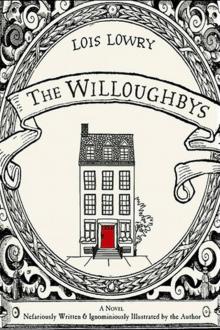 The Willoughbys
The Willoughbys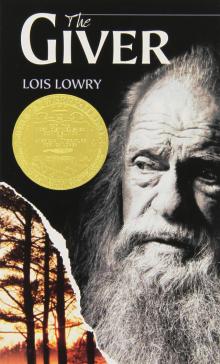 The Giver
The Giver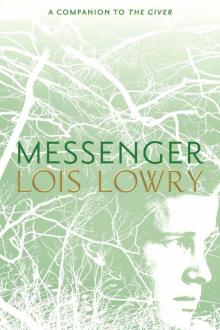 Messenger
Messenger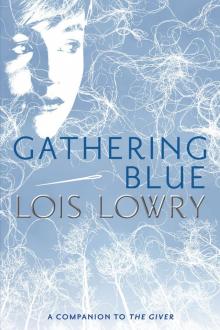 Gathering Blue
Gathering Blue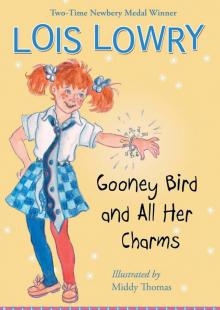 Gooney Bird and All Her Charms
Gooney Bird and All Her Charms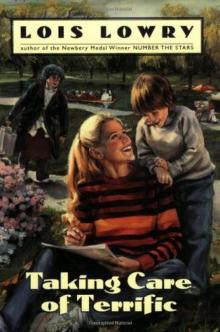 Taking Care of Terrific
Taking Care of Terrific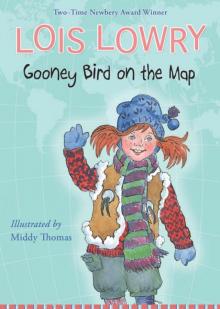 Gooney Bird on the Map
Gooney Bird on the Map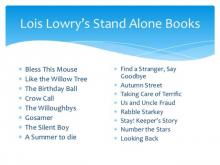 The Birthday Ball
The Birthday Ball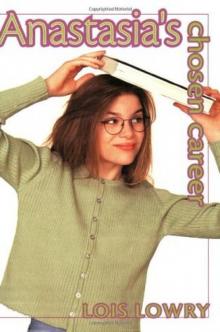 Anastasia's Chosen Career
Anastasia's Chosen Career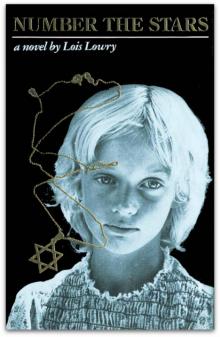 Number the Stars
Number the Stars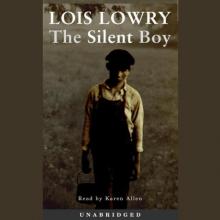 The Silent Boy
The Silent Boy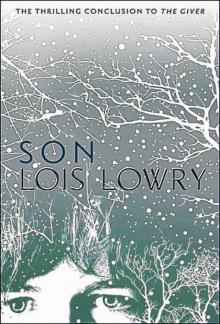 Son
Son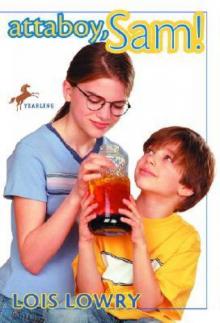 Attaboy, Sam!
Attaboy, Sam!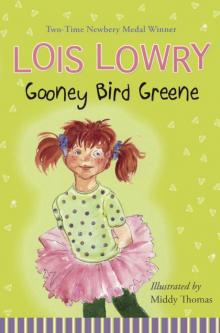 Gooney Bird Greene
Gooney Bird Greene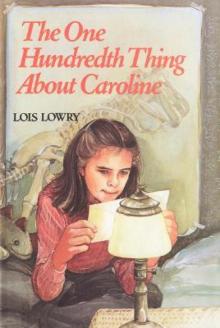 The One Hundredth Thing About Caroline
The One Hundredth Thing About Caroline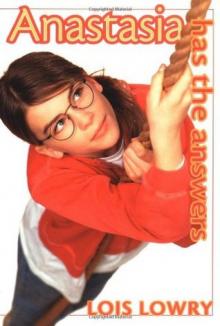 Anastasia Has the Answers
Anastasia Has the Answers Your Move, J. P.!
Your Move, J. P.!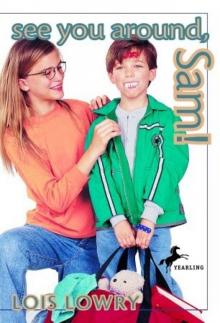 See You Around, Sam!
See You Around, Sam!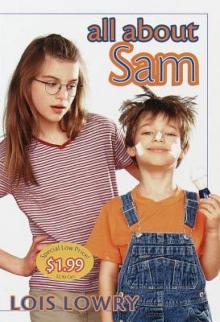 All About Sam
All About Sam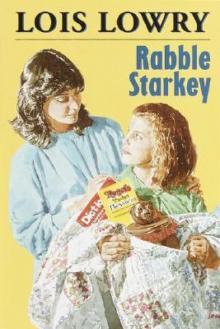 Rabble Starkey
Rabble Starkey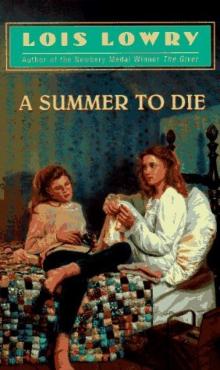 A Summer to Die
A Summer to Die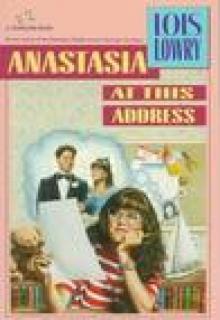 Anastasia at This Address
Anastasia at This Address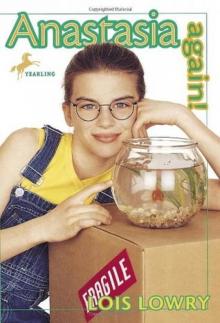 Anastasia Again!
Anastasia Again!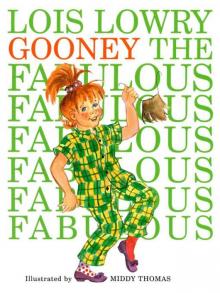 Gooney the Fabulous
Gooney the Fabulous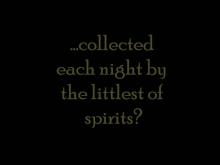 Gossamer
Gossamer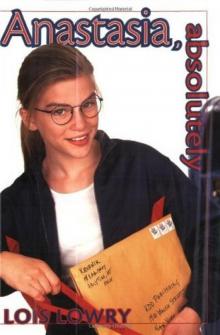 Anastasia, Absolutely
Anastasia, Absolutely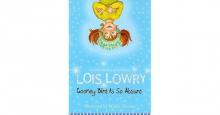 Gooney Bird Is So Absurd
Gooney Bird Is So Absurd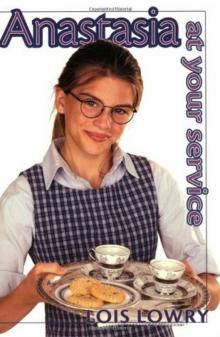 Anastasia at Your Service
Anastasia at Your Service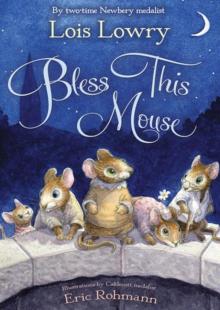 Bless this Mouse
Bless this Mouse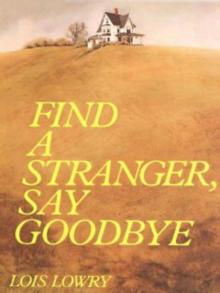 Find a Stranger, Say Goodbye
Find a Stranger, Say Goodbye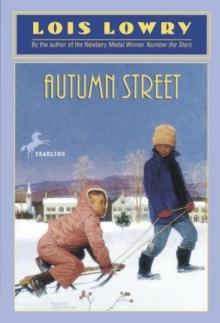 Autumn Street
Autumn Street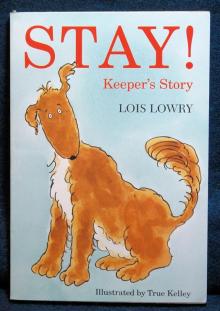 Stay Keepers Story
Stay Keepers Story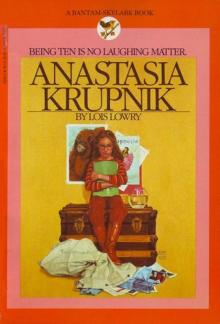 Anastasia Krupnik
Anastasia Krupnik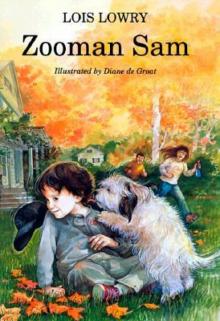 Zooman Sam
Zooman Sam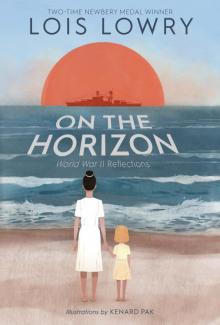 On the Horizon
On the Horizon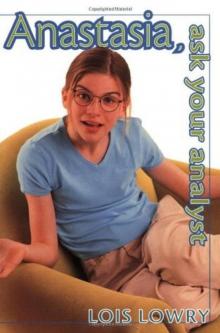 Anastasia, Ask Your Analyst
Anastasia, Ask Your Analyst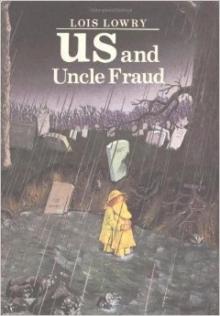 Us and Uncle Fraud
Us and Uncle Fraud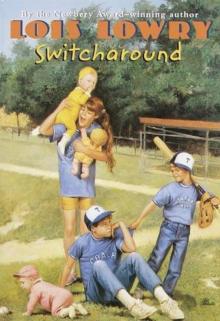 Switcharound
Switcharound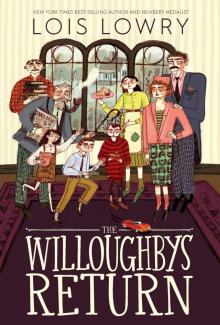 The Willoughbys Return
The Willoughbys Return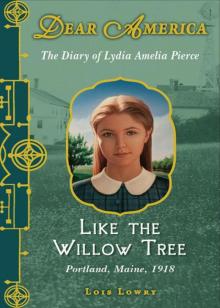 Dear America: Like the Willow Tree
Dear America: Like the Willow Tree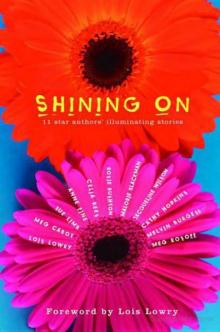 Shining On
Shining On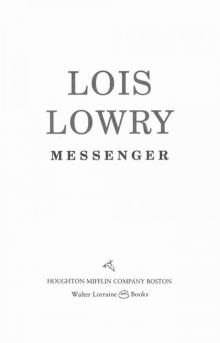 Messenger (The Giver Trilogy)
Messenger (The Giver Trilogy)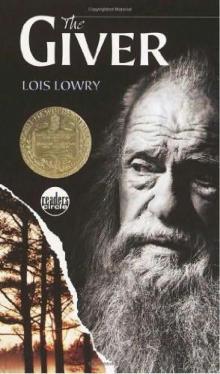 Giver Trilogy 01 - The Giver
Giver Trilogy 01 - The Giver